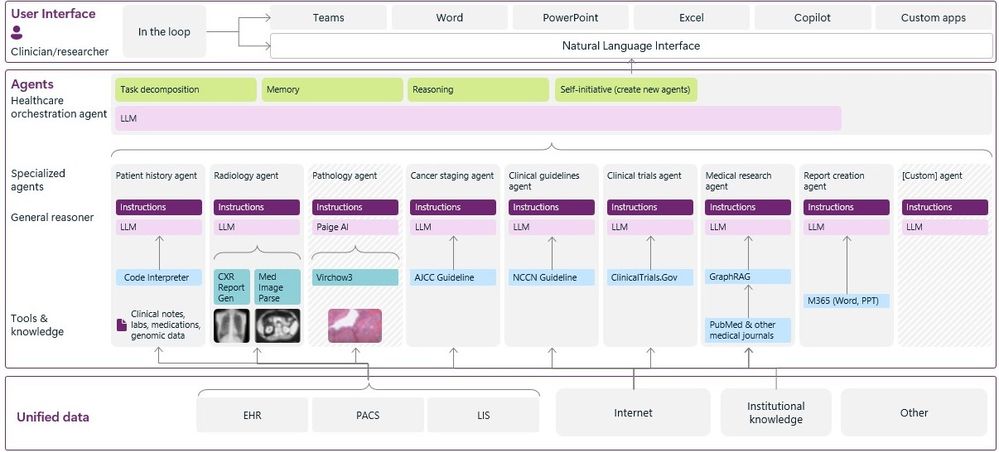What if artificial intelligence (AI) collaborated alongside clinicians, reflecting the teamwork required in real-world care. Microsoft’s Healthcare Agent Orchestrator is working on this feat of science fiction by introducing a multi-agent AI framework that brings together diverse, specialized models, creating a system that mirrors human collaboration and enhances clinical decision-making.
Why Multi-Agent AI Is Essential
Healthcare decisions rarely occur in a vacuum. Diagnoses and treatment plans often require input from radiologists, pathologists, geneticists, and more, each interpreting unique data. To reflect this multidisciplinary approach, Microsoft developed the orchestrator in partnership with healthcare providers and real tumor board data. This unique dataset enables the system to train and evaluate how AI agents communicate, collaborate, and coordinate on complex cases.
The Shortcomings of One-Size-Fits-All AI
- Precision matters: In healthcare, even minor AI errors can have serious consequences for patient safety and outcomes.
- Handling diverse data: Clinicians must integrate images, lab reports, and genetic information, tasks that generic AI models often struggle to manage cohesively.
- Transparency required: Every step of the AI’s process must be traceable and auditable to meet clinical standards.
The orchestrator solves these challenges by integrating general reasoning with domain-specific agents, ensuring that recommendations are explainable and clinically relevant.

Architecture Overview of the Healthcare Agent Orchestrator.
Building the Orchestrator: Architecture Highlights
The orchestrator sits atop a secure, modular AI infrastructure featuring:
- Semantic Kernel: An open-source toolkit that enables seamless integration and development of AI agents across multiple programming languages.
- Model Context Protocol (MCP): An open standard to guarantee secure, two-way data integration.
- Magentic-One: Microsoft’s generalist multi-agent system, facilitating open-ended communication and task management among agents.
Specialized agents, ranging from radiology reporting to clinical trial searches, work together within this environment. Modularity allows the easy addition of new models, ensuring the system stays current without disrupting clinical workflows.
Meet the Specialized Healthcare AI Agents
- CXRReportGen: Produces high-quality, interpretable radiology reports from chest X-ray images and data.
- MedImageParse: Excels at segmentation, detection, and recognition across nine types of biomedical images.
- MedImageInsight: Finds similar clinical cases quickly, streamlining diagnostic review and decision-making.
These expert agents contribute targeted insights while the orchestrator coordinates their efforts and synthesizes information for clinicians.
Seamless Integration into Clinical Workflows
Rather than adding digital complexity, the orchestrator extends its power into familiar platforms like Microsoft Teams. Clinicians can interact with agents through natural conversation, request second opinions, or seek clarification, all within their primary workspace. This approach minimizes workflow disruption and encourages widespread adoption.
Building Trust and Reliability
- Error prevention: The system contains checkpoints to ensure that mistakes from one agent don’t affect the entire process.
- Selective activation: Only the most relevant agents are engaged for each case, reducing noise and confusion.
- Full transparency: All agent interactions and rationales are accessible, supporting audits and early error detection.
Microsoft has extended beyond standard AI orchestration by adding healthcare-specific features for precision, safety, and regulatory compliance. Custom evaluation metrics monitor agent selection, intent resolution, and output reliability, reinforcing trust in AI-driven collaboration.
The Healthcare Agent Orchestrator represents a leap forward in making AI a genuine partner in patient care. By prioritizing transparency, modularity, and real-world relevance, it empowers clinicians to make faster, better decisions, with AI enhancing, not replacing, teamwork and expertise.

AI Orchestration in Healthcare: Teamwork with Multi-Agent Collaboration